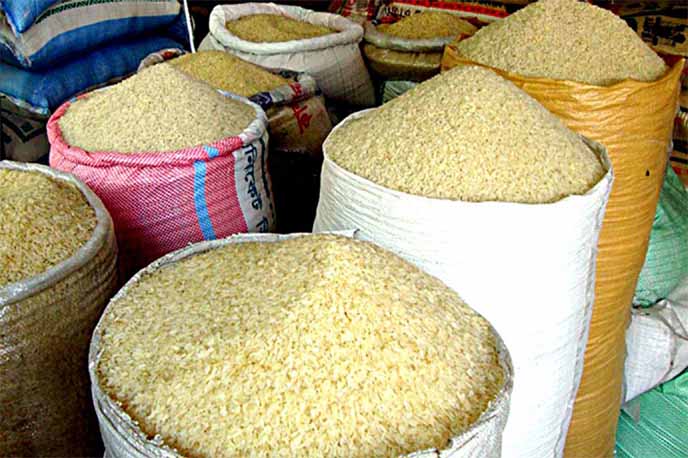
Economic Reporter :
The prices of all varieties of rice, the staple of Bangladeshis, are increasing at a rate that even the sellers call `unusual`, without any good reason in the city’s markets.
Experts said the government must act promptly to ensure smooth supply chain in order to prevent any possible crisis for the cereal in the coming weeks.
Visiting several retail markets in the capital on Thursday, this correspondent found that different kinds of rice are now sold at a higher price. Of these, the price of bristly rice, which is the staple food of low-income people, has risen again.
Swarna 28, a coarse rice variety, was selling at a minimum of Tk42 to a maximum of Tk48 per kilogram. But the price of the rice was between Tk 38-45 per kilogram a week ago.
According to the Trading Corporation of Bangladesh (TCB), the price has gone up by Tk3 per kilogram in a week. The current price is 19.44 percent higher than that it was in the same period last year. Arifur Rahman, a private job holder who came to purchase rice at a grocery store in the DIT residential area of Badda, said that the country’s biggest paddy season was going on.
“Every year at this time, rice prices drop. But the scenario is opposite now, it is on the rise. We are having a decreased income but the cost of living is increasing every day,” he said.
Agrarian Research Centre chairman Prof Abdul Hamid said rice output in Aman season set a record and prices of paddy were much lower than that of production costs.
Aman production saw a record 14.5-million tonnes, so there was no reason for such a tectonic rise in the staple prices for now, he observed.
Prof Hamid called for bringing big millers and their allied traders, and local as well as city wholesalers under a strict watch to prevent illegal hoarding.
The government should fulfill its procurement target of 1.8 million tonnes in time to continue its social safety-net programmes, he suggested.
Traders are of the opinion that the price of paddy has increased, so the price of rice is on the rise. The farmers are profiting more by selling rice this year than in other years.
It is known that paddy is being sold at Tk850-1,050 per maund. However, the government is buying paddy for Tk1,040 per maund.
Abdul Hai, a wholesaler in Kawran Bazar said, “The price of rice is higher because of the high price of paddy.”
On the other hand, four pieces of eggs were sold for Tk35. The price has increased by 7.94 percent. However, a dozen eggs cost between Tk100 – Tk105.
In line with eggs, the price of broiler chickens has also increased. It now costs Tk160-Tk165. However, it was Tk140-Tk145 a couple of weeks ago.
The prices of all varieties of rice, the staple of Bangladeshis, are increasing at a rate that even the sellers call `unusual`, without any good reason in the city’s markets.
Experts said the government must act promptly to ensure smooth supply chain in order to prevent any possible crisis for the cereal in the coming weeks.
Visiting several retail markets in the capital on Thursday, this correspondent found that different kinds of rice are now sold at a higher price. Of these, the price of bristly rice, which is the staple food of low-income people, has risen again.
Swarna 28, a coarse rice variety, was selling at a minimum of Tk42 to a maximum of Tk48 per kilogram. But the price of the rice was between Tk 38-45 per kilogram a week ago.
According to the Trading Corporation of Bangladesh (TCB), the price has gone up by Tk3 per kilogram in a week. The current price is 19.44 percent higher than that it was in the same period last year. Arifur Rahman, a private job holder who came to purchase rice at a grocery store in the DIT residential area of Badda, said that the country’s biggest paddy season was going on.
“Every year at this time, rice prices drop. But the scenario is opposite now, it is on the rise. We are having a decreased income but the cost of living is increasing every day,” he said.
Agrarian Research Centre chairman Prof Abdul Hamid said rice output in Aman season set a record and prices of paddy were much lower than that of production costs.
Aman production saw a record 14.5-million tonnes, so there was no reason for such a tectonic rise in the staple prices for now, he observed.
Prof Hamid called for bringing big millers and their allied traders, and local as well as city wholesalers under a strict watch to prevent illegal hoarding.
The government should fulfill its procurement target of 1.8 million tonnes in time to continue its social safety-net programmes, he suggested.
Traders are of the opinion that the price of paddy has increased, so the price of rice is on the rise. The farmers are profiting more by selling rice this year than in other years.
It is known that paddy is being sold at Tk850-1,050 per maund. However, the government is buying paddy for Tk1,040 per maund.
Abdul Hai, a wholesaler in Kawran Bazar said, “The price of rice is higher because of the high price of paddy.”
On the other hand, four pieces of eggs were sold for Tk35. The price has increased by 7.94 percent. However, a dozen eggs cost between Tk100 – Tk105.
In line with eggs, the price of broiler chickens has also increased. It now costs Tk160-Tk165. However, it was Tk140-Tk145 a couple of weeks ago.

